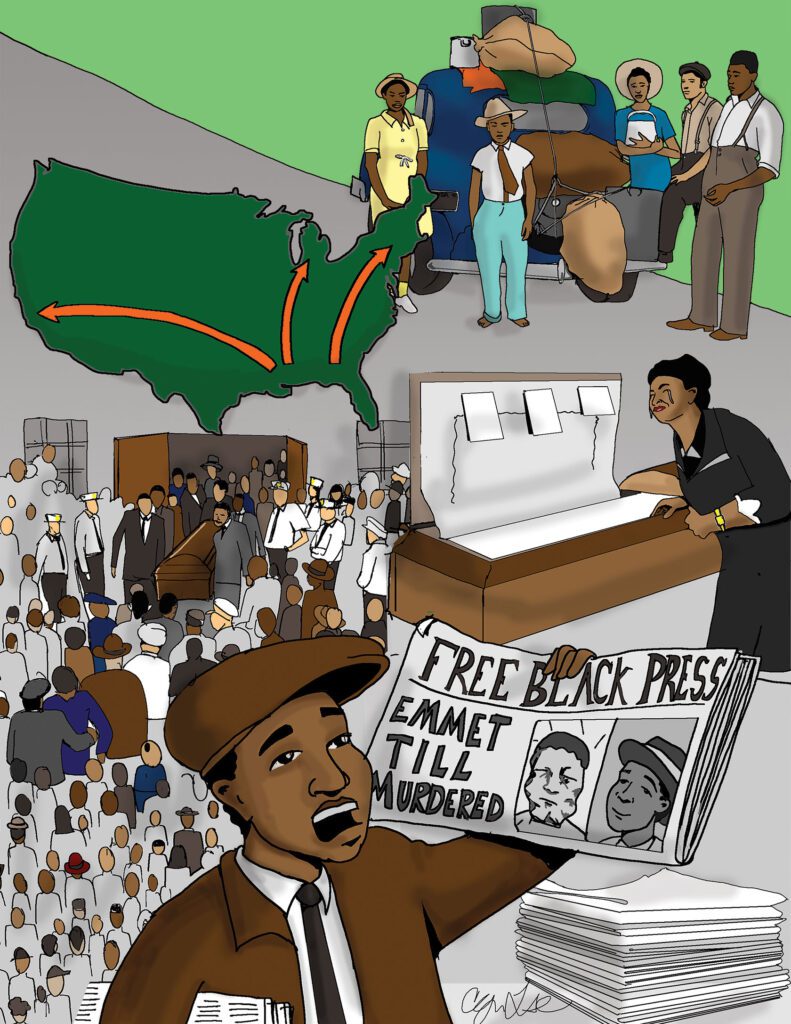
With the pomp and circumstance of a legislative bill signing, President Biden last week declared three sites in Mississippi and Illinois as national landmarks in remembrance of Emmett Till. The first two signs placed along the Tallahatchie River marking the place Till’s mutilated body was recovered had been repeatedly shot full of holes. The brand new historic marker there is steel, three inches thick, bulletproof and cannot be removed. The national monument will also be provided police protection.
During the ceremony, Biden gave credit to the Black press for telling the story of Till’s lynching, the horror of white supremacy and racism. At the request of his mother, Mamie Till-Mobley, Jet magazine put on its cover a photo of his disfigured body lying in a funeral casket because she “wanted the world to see what they did to my baby.” The appalling image was reprinted in newspapers across the country, triggering the civil rights movement, according to historians. Photographer Moneta Sleet became the first Black journalist to win a Pulitzer Prize.
That is one of the most powerful examples of how the Black press brought change to this country and attention to the horrific, Southern racist terrorism going on at the time that far too many Black Americans had to endure. By clearly presenting the unvarnished truth, the Black press shined a bright light into darkness.
In the early days of America, the Black press produced the only publications where Black Americans we could see true stories and images of ourselves. The mainstream, white-owned press too often printed derogatory depictions or distorted images that were designed to make us look buffoonish and depicted us as subhuman in order to continue to empower the status quo.
The first Black paper in America, Freedom’s Journal, was founded in 1827. On the front page of the new paper editors Samuel E. Cornish and John B. Russworm wrote: “We wish to plead our own cause. Too long have others spoken for us.”
It was true as true then as it is today. We, as a people must have the ability to tell our own stories in our own words and share our on truth or we will never be truly free in America.
There are about 300 Black-owned newspapers in the country. Some are more than a century old, for example: Philadelphia Tribune (1884), Baltimore Afro-American (1892), New Journal and Guide (Norfolk, Virginia, 1900), Chicago Defender (1905), Pittsburgh Courier (1907) and New York Amsterdam News (1909). They and others have presented hundreds and hundreds of years of journalism.
Collectively, Black newspapers have had a great impact on our society. One of the most momentous was the Great Migration. In the early 20th century, Pullman porters distributed copies of the Chicago Defender and Pittsburgh Courier along train routes connecting northern cities to the South. Many scholars credit those newspapers and stories in them about opportunity and prosperity in the North with helping to trigger the migration of African Americans to Chicago, New York, Detroit and other northern cities.
More recently, Emerge magazine published a cover article in 1996 about a young Black woman who had been sentenced to 24 years in federal prison without a chance of parole — because, unbeknownst to her, her boyfriend was dealing illegal drugs. The story caught the attention of civil rights lawyers who lobbied on her behalf, leading Bill Clinton to pardon Kemba Smith in late 2000. Unfortunately, Emerge had folded earlier that year when its publisher, Black Entertainment Television, withdrew financial support.
With racism on the rise, it is important today as it ever was for the Black press to continue to thrive. Black papers have long been the soul of our community. Many white-owned community papers are falling by the wayside, while others that survive are being bought up by out-of-town conglomerates or private equity firms that strip those papers of resources.
The way for Black papers to avoid that kind of fate is sufficient advertising, readership and financial support to allow them to continue to provide an independent voice that reflects their readers’ interests.
The new historical monument on sites related to Emmett Till and the lynching of the innocent 14-year-old is a reminder of the power of the Black press, as is the enduring impact of the Great Migration and the freedom of Kemba Smith.







